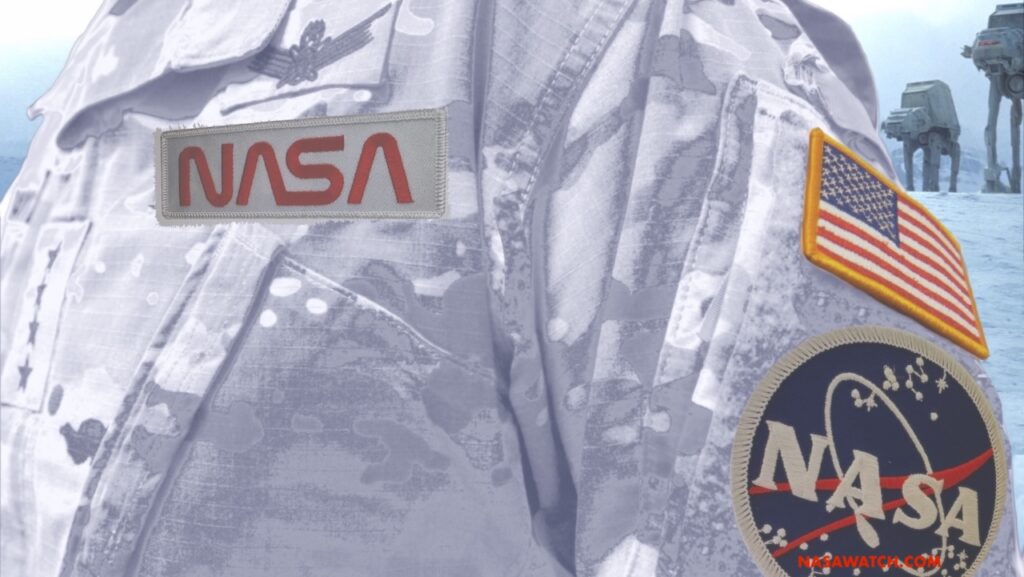Space Force Comes In Many Flavors At Varying Costs

White House Seeks Alternatives to Independent Space Force, Defense One
“The four options, according to one of the officials, include: 1) an Air Force-owned space corps that includes only Air Force assets, 2) an Air Force-owned space corps that also takes space-related troops and assets from the Army and Navy, 3) an independent service that takes from the Air Force, Army, and Navy, and 4) an independent service that takes from the three services plus parts of the intelligence community.”
The creation of a Space Force would cost less than $3 billion, according to a new report, Washington Post
“President Trump’s Space Force, a proposed military department dedicated to fighting war in space, would cost the Pentagon $1.5 billion to $2.7 billion in additional money over five years, according to a study released this week by the Center for Strategic and International Studies, a Washington think tank. That estimate is far below the $13 billion price tag that Air Force Secretary Heather Wilson recently reported to Pentagon leaders and is certain to fuel the debate over the cost and necessity of what would become the first new military service branch since the Air Force was created in 1947. While the White House has pushed aggressively for the establishment of the Space Force, which Trump has championed in rallies, a new military department would need to be approved by Congress. It is unclear whether there is enough support for it to pass.”







I’m having trouble imagining neither the Space Force mission nor the theater. And without a mission, I can’t begin to see exactly what assets are required.
As to theater, don’t even begin seeing space ships roaming the solar system, grand as that might be (and indeed a claimed-requirement could spur some greatly needed new thinking about the sort of hardware we actually want to be using in the coming decades).
For now, though, the theater is earth orbit.
The mission? The nefarious Chinese demonstration aside (for the moment) what exactly is imagined? Raining down nukes from space? That’s a concept from the 50’s and before modern ICBMs.
As to the Chinese demonstration there’s no protection other than hardened, nimble, duplicated satellites, coupled with rapid replacement.
There’s a far more sinister future, though, one in which various nations have extended traditional animosities to Luna, or Mars, or Ceres (don’t laugh- this is not beyond critical reasoning). The theater is the solar system and even so we do what? Beam each other with rail cannons? Really? Shoot fragile space ships out of the sky, watching escape pods hurling to and fro? Seriously?
I do imagine a future, a far too distant future, when there are real assets needing protecting: mines in the asteroid belt, perhaps, home of untold wealth and able to support space-borne factories creating goods for folks actually living in space. Centuries, folks, centuries.
For now our heedless and thoughtless Commander in Chief has everyone scarring around analyzing what is no doubt a thoughtless off the cuff comment. The lesson here has nothing whatsoever to do with a Space Corps.
The mission of a space force is very simple, protecting the satellites in space that our economy needs to function.
No dashing space warriors flying through the Solar System in armed spaceships. Instead it will be electronics and computer experts on Earth monitoring and developing ways to counter potential threats to the many satellites in Earth orbit that enables our economy to function.
It’s very difficult to describe just how dependent we are on space, although you have done a complete job it above.
Now, as to required materiel: what do you see? Beyond, as I’ve suggested, hardening/ rapid replacement would be a huge step forward.
nb: I have no idea, nor have I read anything credible, regarding the “hardening” of space assets. Most of the writing that I’ve read points out that any sort of projectile aimed at a satellite will hardly be deterred by additional armor “plating”. As if.
Truly if we are ever in a situation where an adversary is taking out our birds, we have much, much bigger problems elsewhere.
Yes, as I tell my students. What would you do if you wake up one day and your mobile phones didn’t work, your GPS didn’t work, you couldn’t use your debit/credit cards anywhere including at the ATM and the computer controlled electric power system was probably out so no cash registers, or microwave ovens worked. The dazed looks on their faces as what I said sinks in says it all about how dependent we are on space systems and how helpless most of the population, especially in urban areas, would be.
And it will only be worst when the “Internet of things” age is here. I am not a Luddite, but it probably wouldn’t be a bad thing if, in the name of economic and national security, we backed off with some of the Internet based integration Silicon Valley is selling and reduced our dependence on space systems, at least until we are 100% certain they will never ever fail.
The real question here is if the USAF, with its fighter plane based leadership, understands how critical its space mission is and provides the support it needs to perform it, or if it doesn’t understand it fully and just sees their space budget as something to raid for other expenses or cut to build more fighters.
The truth is likely somewhere in between those extremes and needs to be determined. Once it is then, and only then, it will be possible to have discussions on what form and organization a space force/corps should take, how independent it needs to be, and what type of budget is needed.
>What would you do if you wake up one day and
>your mobile phones didn’t
work, your GPS
>didn’t work, you couldn’t use your debit/credit
>cards
anywhere including at the ATM
Some years ago (2009?) in Morgan Hill, CA just south of Silicon Valley someone cut a fiber which caused complete blackout of cell and internet in south Santa Clara County and Santa Cruz county. There were amateur radio operators stationed at libraries and schools to provide emergency comms if needed. They said students would exit the buildings holding their phones in the air crying because they can’t get a connection. People low on gas couldn’t buy any because the ATMs were down. Many stores had sales plummet because ATMs and credit card readers didn’t work. Many times situations like this happen in disasters (fires, floods) but unthinkable if were to occur in an area covering several states.
Getting back to Space Force, a very dramatic name and with traditional USAF fighter plane leadership (if you don’t have wings on your chest, you will not get stars on your shoulders). But those that maintain space assets are like those that maintain networks, all sitting behind monitors. I always find it odd to see military personnel at these network centers wearing cammo and flight suits.
I don’t know details or inner workings but if thinking about maintain, upgrade, and protecting space assets we need to look beyond Hollywood perspective and understand what is really needed. And establish sustainable budget and resources rather than creating a pork system (which may not help in event of a real crisis).
You’re thinking in terms of shooting missiles at satellites, and protecting against that. But there are other ways to disable a satellite.
Just as one example, many spy satellites are, basically, a telescope which points down and has some sensitive detectors and electronics behind it. Pointing a laser up at such a telescope could disable it. Not just temporarily, but permanently, by seriously overloading those sensitive detectors and electronics. Off the top of my head, I can think of one way to designs the satellite to make it less vulnerable to that, and there are probably more ways to do it. In some forms, a Space Force might be about putting that sort of design work (or specifying requirements for it to the manufacturer) under one roof.
There are also operational issues. Satellites in high orbits are much less easily attacked than those in Low Earth Orbits, and there is much more warning time. (E.g. it takes a couple hours to go from launch to geostationary orbit.) That might be time to do something. At worst, it might be a good idea to develop satellites which can do the job of current LEO spacecraft from a higher orbit. That would be a policy and planning decision, and I’m not sure if it makes sense for the Air Force, Navy and Army to separately decide to do different things.
And, in the case of actually shooting missiles at LEO satellites, there are serious orbital debris concerns. That might deter many countries from using missiles (as opposed to jamming, spoofing, blinding, etc.) For other countries, it could be a side benefit, since it could take out multiple satellites. I’m not sure if cleaning up the trash is a job the Pentagon would want, but it might be an important part of protecting space assets.
Yes, and there have also been rumors of hackers trying to take control of satellites. Messing with a satellite’s software would take it out very effectively and it is possible no one would know who did it – some rogue hacker group or the bad guys?
I’ve never heard of a case of a spacecraft being hacked, but that doesn’t mean it’s impossible. It would take a good understanding of how the spacecraft worked (which is easier with common bus spacecraft), access to the command dictionary and all the details of the telemetry protocols. I’d also expect national security satellites to have some decent encryption and command verification software. All that makes hacking a spacecraft very difficult. But I doubt it would make it impossible.
Um…The Air Force already does that. And they do a darn good job of it too.
They do? How do you reach this conclusion? Maybe you are right but I don’t see how to assess AF’s satellite protection efforts?
And once upon a time the U.S. Army had long range bombers to defend coastal areas. The question is how do we improve on it.
The real question should be which version would work best in protecting our digitial economy which is heavily dependent on space assets. All are cheap when you consider the impact of the nation losing its mobile phones, Internet, navigation, banking, etc. Without satellites mobile phones won’t work, commercial aviation is grounded and business comes to a halt. That is really what is at stake here.
It might not be quite that bad. Many of the services you describe are used by a large number of countries. Targeting those assets would likely cause a large number of countries to declare war on the nation responsible. Dedicated military assets are a different matter. Non-belligerents probably wouldn’t care if someone disabled a NSA surveillance satellite (and some would probably cheer…)
Is this the female dress uniform for the Space Corps?
https://www.theonion.com/na…
Well, I have a very different vision of the Space Force than those commenting so far (Although I love the dress uniform for women!). Very soon, humans will be populating the moon and mars. So, let us imagine a scenario: The USA has established a lunar base on the most valuable real estate in the solar system right now, the eternally illuminated ridges of the moon’s south pole. Then, the Chinese set up a base on the opposite end of the same ridge, and starts to deploy their solar arrays. Diplomatic talks on Earth fail to resolve the issue. A physical presence may be required, to delineate where exactly US solar arrays are allowed, and Chinese are allowed. This scenario should not in any way involve a war between the two, just a necessary demonstration that the USA is in control of this area. If there was no Space Force, then the USA would not in any way be in control, and the risk of an increasing crisis would be greater. With of course the risk of a greater war.
Another scenario? OK how about Elon Musk sets up a base on mars and is harvesting ice (absolutely essential to his vision, to allow return fuel to be processed). Then China lands and says, no no no, this is international ice, and all countries on the Earth demand a share! A visit by a Space Force SpaceX Starship should be enough to deter overly aggressive behavior.